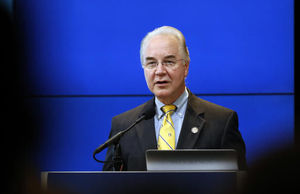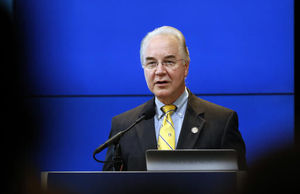Alaska’s “reinsurance’’ program is being touted by the White House as a state-based innovation that can lower premiums and buttress the health insurance market.

The head of the U.S. Department of Health and Human Services, Tom Price of Georgia, said Monday in a statement that a provision of the Affordable Care Act allows waivers “to modify existing laws or create something entirely new to meet the unique needs of their communities.” The ACA, also known as Obamacare, is the target of repeal efforts in Congress. But it remains in force, along with the waiver provision noted by Price.
The HHS comments come on the same day as the nonpartisan Congressional Budget Office estimated that the House Republican plan to repeal and replace the ACA would cause 24 million people to lose health insurance within a decade. The CBO also said the Republican bill, titled the American Health Care Act, would reduce the federal deficits by $337 billion over 10 years.
A reinsurance program aims to stabilize health insurance premiums by capping the cost that insurers incur in covering people with high medical costs.
Premiums have spiked in the ACA-created health insurance exchanges in the individual states, though the large majority of people have received higher subsidies to offset those hikes.
Federal officials said Monday that they were inviting states to pursue waiver proposals that include “high-risk pools” and state-operated reinsurance programs.
The high-risk pool idea has already drawn some attention in Georgia. State Insurance Commissioner Ralph Hudgens has called on Congress to fund a high-risk pool, which differs from reinsurance in that it would segment people with pre-existing health conditions into a separate insurance pool.
A high-risk pool, funded by the feds and run by states, would allow the risk pool for other people “to function normally,” Hudgens said in a letter to congressional leaders earlier this year.
Prior to the ACA, Georgia had a high-risk pool on the books but never funded it.
Several states did operate these pools, including Wisconsin and Minnesota, where consumers paid significantly higher premiums. “Individuals had to demonstrate they were uninsurable’’ prior to getting this coverage, said Bill Custer, a health insurance expert at Georgia State University.
Some other states’ pools were not as well funded, he added.
The ACA, before it was fully implemented, created a temporary pool that attracted thousands of people with medical conditions, including hundreds of Georgians. Custer said the ACA pool for pre-existing conditions wound up costing a national average of $38,000 per individual covered.

Such high-cost individuals have been cited by insurers as a reason for cutting back on their participation in the health insurance exchanges.
Health insurer Humana said last month that it would exit the insurance exchanges in Georgia and other states next year, citing the medical costs for high-risk patients they had covered.
In Alaska, the reinsurance program was developed after premiums under the ACA skyrocketed by almost 40 percent a year, due to the cost of covering fewer than 500 residents who were among the sickest in the state. (The number of people in this category is so small because Alaska is sparsely populated, with fewer than 800,000 residents overall.)
Last summer, the Alaska government allocated $55 million for at least a year to cover the health care costs for those seriously sick patients, whose large medical bills spurred insurers to hike premiums for all 23,000 customers in a bid to remain profitable, the Wall Street Journal reported.
The move stabilized insurance premiums in the state.
The Section 1332 waiver program under the ACA, which HHS cited Monday, said that states could experiment with different programs if they could demonstrate the new initiative would cover a comparable number of people at the same cost to the federal government.
Alaska is seeking a special waiver to receive federal funding to offset this spending, basing its request on savings to the government from lower tax credits or subsidies.

Premera, the remaining Alaska exchange insurer, said it believes Alaska’s “solution will build a more stable and sustainable market without broad swings in premiums,” according to the Wall Street Journal.
The Republican plan being debated now in Congress as a potential replacement for the ACA would also establish an innovation program, with $100 billion in federal funding over 9 years to let states provide financial help to high-risk individuals.

